
- Home
- News
- Analysis
- States
- Perspective
- Videos
- Education
- Entertainment
- Elections
- World Cup 2023
- Features
- Health
- Business
- Series
- Economy Series
- Earth Day
- Kashmir’s Frozen Turbulence
- India@75
- The legend of Ramjanmabhoomi
- Liberalisation@30
- How to tame a dragon
- Celebrating biodiversity
- Farm Matters
- 50 days of solitude
- Bringing Migrants Home
- Budget 2020
- Jharkhand Votes
- The Federal Investigates
- The Federal Impact
- Vanishing Sand
- Gandhi @ 150
- Andhra Today
- Field report
- Operation Gulmarg
- Pandemic @1 Mn in India
- The Federal Year-End
- The Zero Year
- Premium
- Science
- Brand studio
- Home
- NewsNews
- Analysis
- StatesStates
- PerspectivePerspective
- VideosVideos
- Entertainment
- ElectionsElections
- Sports
- Loading...
Sports - Features
- BusinessBusiness
- Premium
- Loading...
Premium
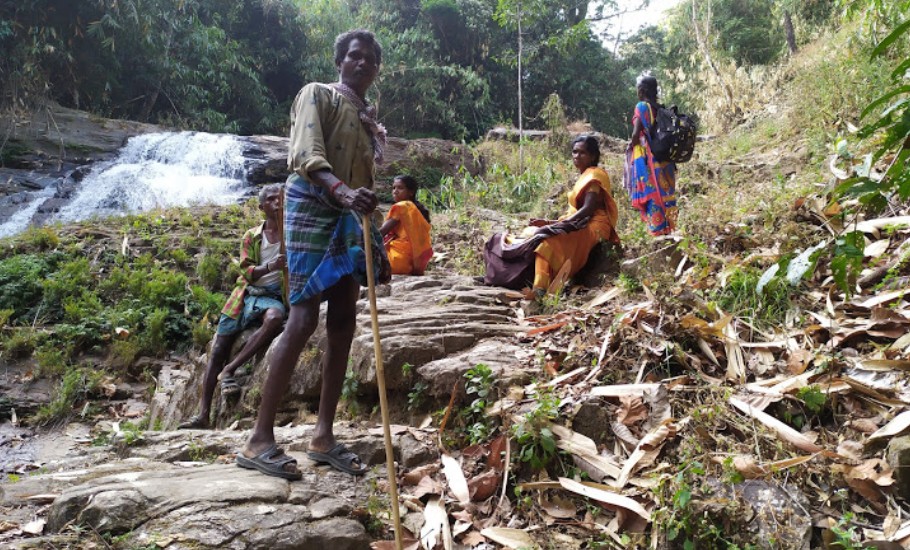
How lockdown has hit tribal communities and forest dwellers
Lockdown restrictions have affected tribal communities and forest dwellers, whose livelihood depend on collecting and selling forest produce.

On normal days, Sanniyasi, a Paliyar tribe member in Vadakadu, a tribal village in Dindigul district of Tamil Nadu, would have gone into the forest in search of honey. Along with 5-6 friends, he would carry a rope and a sickle using which he would climb trees and tap honey from beehives. The Tamil months of Chithirai (April-May) and Vaikaasi (May-June) are the best times to collect honey,...
On normal days, Sanniyasi, a Paliyar tribe member in Vadakadu, a tribal village in Dindigul district of Tamil Nadu, would have gone into the forest in search of honey. Along with 5-6 friends, he would carry a rope and a sickle using which he would climb trees and tap honey from beehives.
The Tamil months of Chithirai (April-May) and Vaikaasi (May-June) are the best times to collect honey, he says. ”Last year, I was in the forest around this time. Unfortunately, this year, I am just sitting at home.”
It is not only Sanniyasi, but 30 other men in his village are now feeling the heat of COVID-19 lockdown.
“All of the men in our village are dependent on honey gathering. In off season, we do menial jobs like agricultural or construction work. Women too work as daily wage labourers for samsaris (the landlords),” he says.
On April 6, the Ministry of Environment, Forests and Climate Change (MoEFCC) instructed all states to ensure the restriction of movement of people inside national parks, sanctuaries and tiger reserves. This was aimed at reducing human animal conflicts during the COVID-19 lockdown.
Livelihood hit
This has in turn affected tribals like Sanniyasi who live either on the edges of forests or within them and eke out a living from minor forest produce (MFP) such as tamarind, wild honey, sal leaves, etc, which are largely collected and sold by women. As per the Report of the National Committee on Forest Rights Act, 2011, about 100 million forest dwellers’ livelihood depend on MFP.
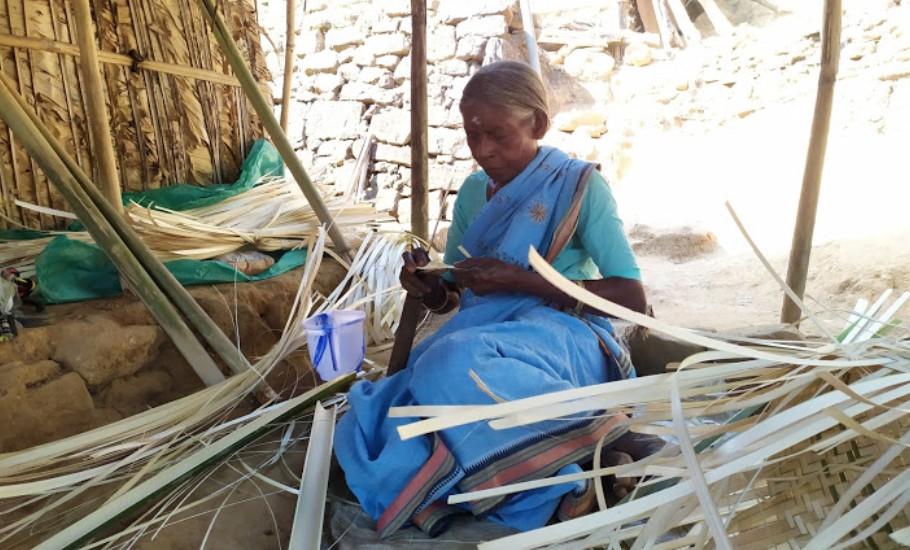
As in the case of honey, the period between April and June is considered the best season to collect MFP, but due to the lockdown, tribals have already lost two months of collection. Also, the restrictions have affected people of certain tribes settled or moving inside forests, who are unable to come out of their settlements to the plains or the cities nearby.
During the lockdown, Van Gujjars, a nomadic tribe of buffalo-herders who move around the foothills of Himalayan states like Jammu and Kashmir, Himachal Pradesh and Uttarakhand, were reported to have been stopped by the forest department from selling milk to the cities of Dehradun and Rishikesh in Uttarakhand, based on rumours that they were carriers of COVID-19, and so they threw away the milk. Even in Punjab, residents of some apartments refused to take milk provided by them on apprehensions that they were connected to the Tablighi Jamaat event in Delhi.
“We’ve been selling milk in Rishikesh for ages, but a killer virus has spelt doom for our thriving business. Overnight, we’ve become untouchables,” a member of the tribe was quoted as saying by Hindustan Times.
Unable to go to the mountains, where their cattle feed on fresh grass, due to the lockdown, these people have suffered not just economic losses but also lost some of their cattle to hunger.
A group of forest rights activists across the country has pointed this out in a report, saying there is a great danger the environment ministry’s advisory may be misunderstood and misused to further alienate and restrict access of these tribal communities to the natural resources that they are dependent on for their lives and livelihoods.
The ministry of tribal affairs had written to state chief ministers to give relaxation to MFP collection from the lockdown. But like farmers, despite the guidelines, the police in most states did not allow tribals to transport their produce to the market.
It is against this backdrop that the tribal affairs ministry increased the minimum support price for 49 MFPs on May 1 by around 16% to 66%.
However, what is most critical is the institutional support that doesn’t exist for the collection and procurement of MFPs with immediate payment, say experts.
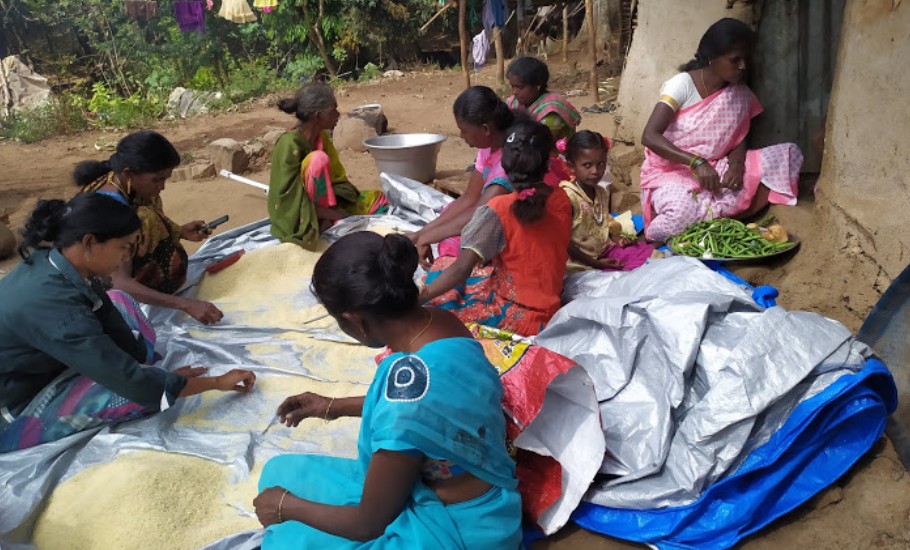
“The proposal for providing support through Van Dhan Vikas Kendras (VDVKs) would not help, as so far, there are only about 1,000 VDVKs. Most of even these VDVKs are not fully functional. Similarly, the primary procurement agencies (PPAs) proposed earlier by TRIFED (Tribal Cooperative Marketing Development Federation) for facilitating implementation of MSP schemes have not been constituted in the states or are not functional,” said the report by the forest rights activists.
It is unfortunate that the Van Dhan programme does not include tendu leaves and mahua flowers, two of the most valuable forest produces from the income point of view. Adding salt to injury, GST is applicable for tendu leaves. This has put tribals of Maharashtra, Odisha, Jharkhand and Bihar in a fix.
Life in forest during COVID times
“About 70% of tribals are dependent on forests. They use the community assets equally,” says Thanaraj, a tribal activist and Tamil Nadu state convenor of Ekta Parishad.
Because of the restrictions on movement and fear of COVID-19, tribes like the Kadars in Valparai in the Western Ghats in Coimbatore district, they have been forced to move further interior into the forest.
No outsider can reach them and volunteers too are finding it difficult to reach these people and distribute relief materials, he says, adding that the tribals do not bother about food. “They have returned to their roots. They started eating potatoes, tubes, fruits, rats and frogs.”
The pandemic has also taken tribals back to historic times, says Thanaraj, when they would leave their villages to deal with a disease spread and move to a new place and build a village there.
“The practice is followed even today,” says Thanaraj, but adds that today, they leave their houses made of bricks and mortar for some time and go to the hills and forest. “When the pandemic decreases, they come back.”
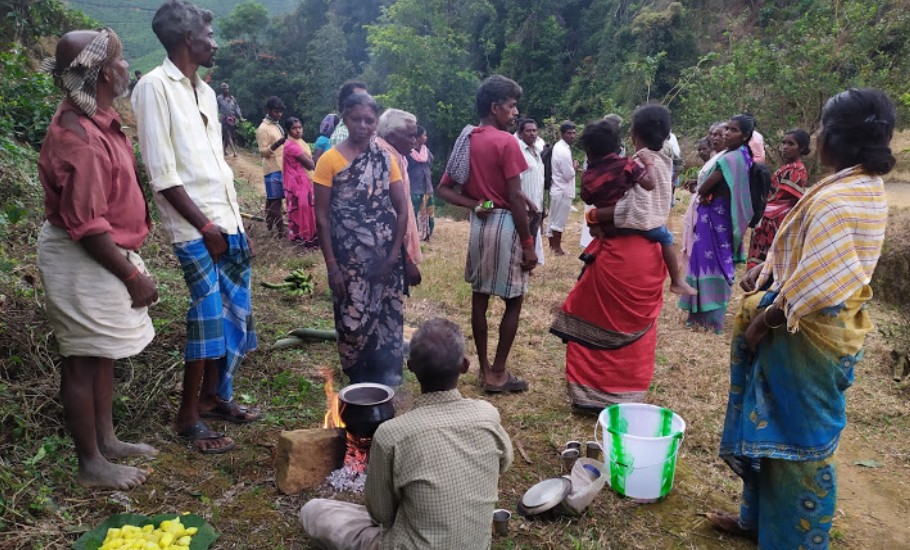
There are various tribes who live in 18 districts of Tamil Nadu, such as Kadar, Muduvar, Paliyar and Irulars who continue such practices.
Thanaraj also accuses the forest department, which is responsible to protect tribals, of having forsaken them and of having unleashed its power on these tribals on the pretext of the lockdown.
“In Theni forest range, some forest officials felled banana trees grown by tribals, saying they had encroached forest land and grown these, whereas, the actual encroachers have gone scot free,” he alleges.
On April 9, there were reports about the deaths of two tigers in Anamalai Tiger Reserve. The initial probe said that they were poisoned.
“On April 17, the forest officials arrested two farm workers — one a Scheduled Caste member, and the other a Scheduled Tribe person — who were working at a farm nearby where the tigers died. But the owner of the farm was not brought into the purview of the case. Such kind of harassments and atrocities are also happening to tribals in this lockdown,” rues Thanaraj.
Using the lockdown as an opportunity, some people have even cheated tribals of money. In Chengalpattu district, more than 40 Irulas were cheated by a man who posed as an SBI manager and swindled money from their accounts.
Natural medicine against modern healthcare
Though most of the tribals practise cleanliness and natural medicine, they are largely unaware about pandemics and COVID-19. Besides being predominantly illiterate, their villages do not have electricity, and this cuts them off from the world outside that is accessible to others through TV or internet.
The few who are aware about the disease due to their proximity to suburban areas hesitate to move with outsiders. Typically detached from the mainstream society, they are even now more reclusive. Tribal groups such as Kurumbas in The Nilgiris district have stopped outsiders from entering their villages.
The lack of hospitals is a perpetual problem for tribals. However, in this time of crisis, the need for a primary healthcare has been realised.
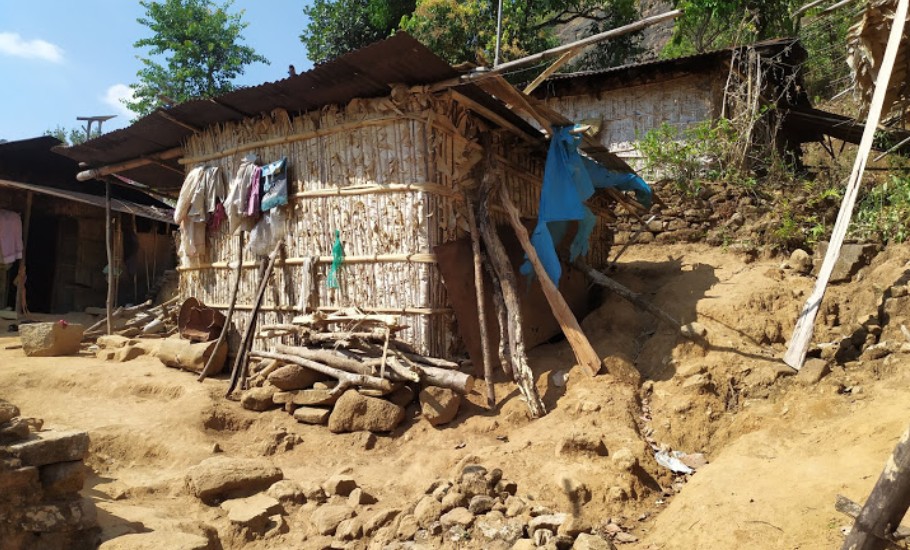
In Anaikatti village in Coimbatore district, the tribals used to visit hospitals only when they were affected with severe stomach pain or fever, where they would spend about ₹500. Otherwise, they always depended on herbal medicines.
“Mobile medical units (used to) come once a week to some villages. But after COVID, they stopped. Because of this, people having other complications like TB, sickle cell anaemia, uterus problems are finding it difficult due to lack of medicines,” says Veerappan, founder of Aadhi Nilam, an organisation working for welfare of tribals in Coimbatore and The Nilgiris.
Some tribal groups think they won’t contract COVID and even if they are given masks, they don’t use it properly, he says.
While modern medicine has cast aspersions on traditional healing methods, forest activists are stressing that traditional medical practices must be a part of the treatment.
“Coordination between health department workers (ASHA, ANM and others) and traditional healers must be part of any such local responses to COVID-19 to ensure traditional knowledge systems are part of these response mechanisms,” says a report jointly prepared by Community Forest Rights – Learning and Advocacy (CFR-LA), All India Forum of Forest Movements and tribal and forest rights groups.
Using CAMPA funds
While announcing the ₹20 lakh crore stimulus package, the Finance Minister Nirmala Sitharaman had said that ₹6,000 crore CAMPA funds can be used for creating employment opportunities for tribals.
The Compensatory Afforestation Fund Management and Planning Authority (CAMPA) was set up in 2016, under Compensatory Afforestation Fund Act. Its main objective is to increase afforestation and regeneration activities to compensate the forest lands diverted to industrial use. The fund deals with all kinds of afforestation activities like plantations, wildlife protection and forest management.
Whenever an industrial project is approved, the concerned company is required to compensate for the diverted forest in monetary terms. For many years, crores of rupees has been lying idle under CAMPA fund. In 2019, the MoEFCC released ₹40,000 crore from this fund to various states for afforestation programmes.
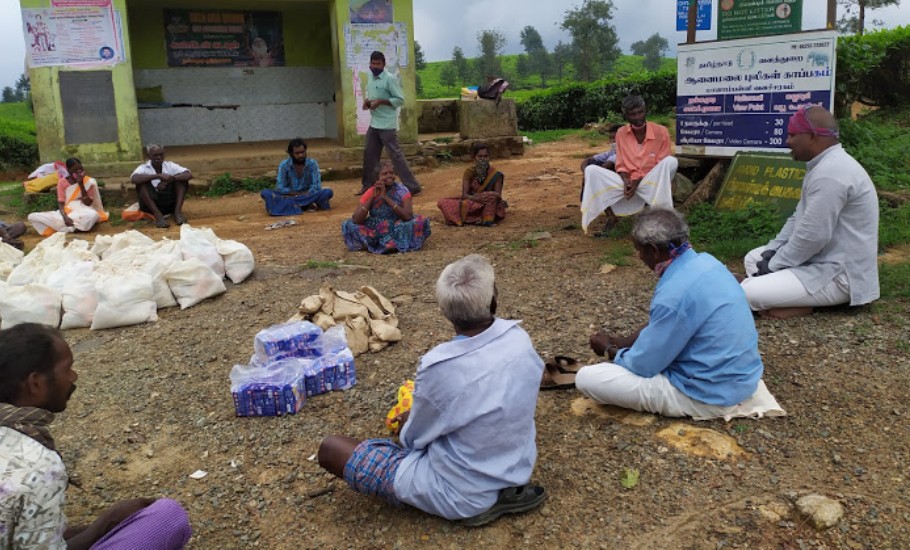
“Whatever money goes into CAMPA fund will be used for compensatory afforestation activities. The normal afforestation activities like digging for plantations is also a kind of employment. You will pay wages to the labourers. How can the special allocation bring a difference then?” asks noted forest rights activist CR Bijoy, adding that the announcement could have made sense if this fund is given directly to Gram Sabhas of tribal villages.
“The government should consult tribals before planning any relief activities,” says the rights activist.
While tribal people are trying to cope with lockdown, the environment ministry has given clearance to 11 projects across the country. Some of these projects require forest diversion but the ministry chose to go ahead without consulting the gram sabhas (village councils).
“Most of the time, we approach the problems of tribals with an urban perspective. They know their needs. Let them decide what they want for their villages,” Bijoy adds.

